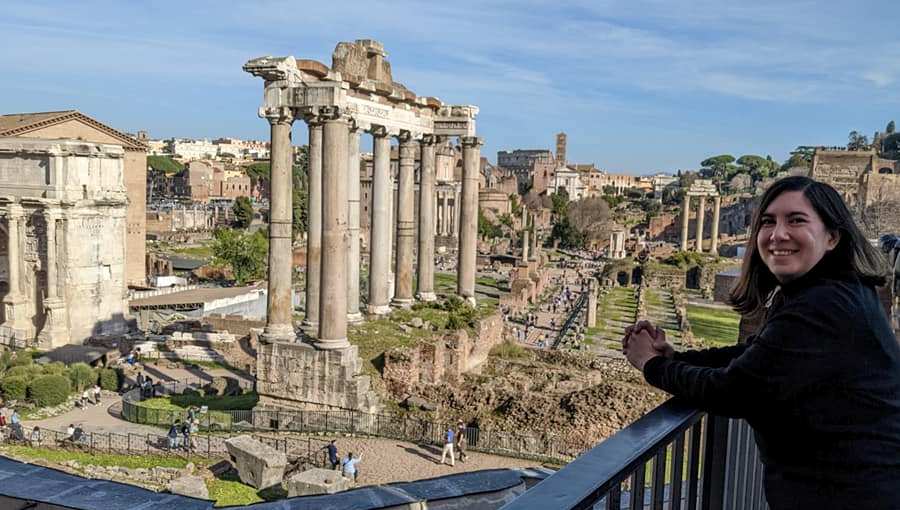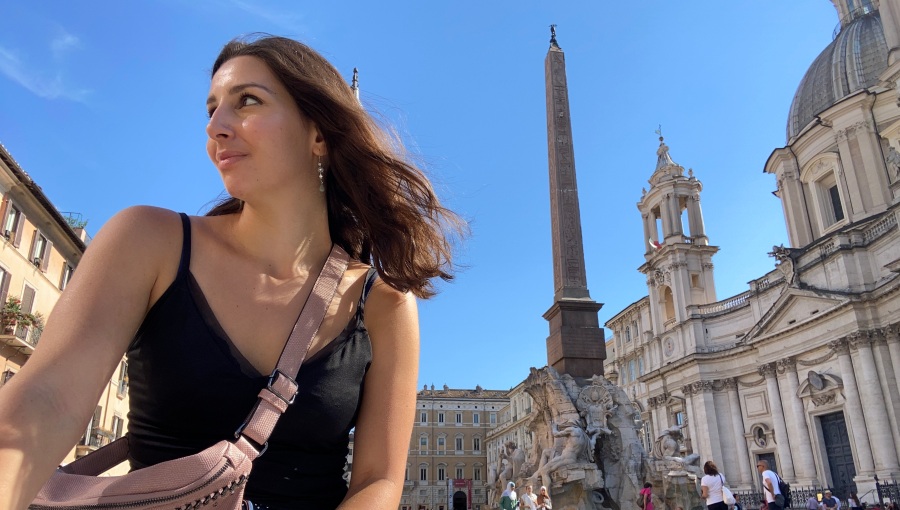A Multifaceted Approach to Art History: Alumna Alice Marinelli
Alice Marinelli, born and raised in Rome, completed her B.A. in Art History at JCU in 2017. Since then, she has been studying art history at University College London (UCL) and working at leading art businesses and galleries in London, such as Christie’s, Victoria Miro, and the Parasol Unit Foundation for Contemporary Art.

Alice Marinelli
Why did you decide to move to London to study art history?
I love Rome, its art and its history, which is why I decided to study art history at John Cabot in the first place. During my B.A. I grew passionate about art historical research and writing. I found that researching for my senior thesis, called “Rethinking Borromini’s Ingegno: The Decorative Program in San Carlo alle Quattro Fontane and the Encomiastic Emblems Embodying the Barberini Era,” was the most demanding and enriching experience during my time at JCU. The moment I held a printed copy of it in my hands, I realized that I wanted my future to be in academia. My JCU professors encouraged me to apply to top universities with prestigious doctoral programs. UCL offered a special M.A. subject on Early Modern Rome and the Body in Caravaggio’s art, which my professor of Baroque art advised me to apply for. When I got my acceptance letter, I had no doubts. This was a unique chance to research Roman art in one of the most dynamic centers for the study of art history and visual cultures in the world. Research is a fascinating and continuous discovery, as well as a way of giving back to Rome.
Can you tell us a bit more about your Ph.D. topic?
My research project developed after various courses, both at JCU and UCL, on Baroque Rome, Caravaggio and early modern practices of art collecting. It endeavors to re-assess the role of religious paintings in seventeenth-century Roman galleries – a new phenomenon in early modern Europe – and the pictorial identity of the so-called ‘Caravaggisti,’ the artistic movement generally defined as Caravaggio’s legacy. I am observing thematic groups of religious gallery paintings produced by these artists and I am studying how visual repetitions and transformations in their work establish intertextual relationships between different subjects – such as the divine and the profane, the transcendent and the bodily – but also how they disrupt and question such dichotomies. By re-defining the role of religious paintings created for the secular context of the Galleria, this exploration aims at opening up widespread, yet still under-investigated, concepts that underlie the making of what is now called ‘Caravaggism.’ These concepts include truth to life, mimesis, the use of the life model, the role of viewing in the making of knowledge, and the process of replication that still binds these artists’ works with the uncontested notion of Caravaggio as the original.
How did John Cabot prepare you for your current studies at UCL?
Studying at John Cabot was crucial for my work at UCL in many ways. First of all, the Art History department equipped me with a solid foundation in the discipline and a passion for engaging first-hand with visual materials. On-site classes developed my ability to observe artworks and architecture from different perspectives, to analyze their visual and physical components, and to think about the strategies and meanings behind their material production. The opportunity to take fine art classes at JCU, such as photography, drawing and graphic design, was instrumental in developing my understanding of visual culture. Observation and creation are at the origin of art historical inquiry and my professors at John Cabot have always valued and encouraged both as the basis for further research into the discipline.
Moreover, what has been extremely educational at JCU is the interdisciplinary curriculum available to students. I was allowed to study several philosophy, history and literature classes alongside the Art History ones required for my Major. The possibility to obtain a Minor in Humanistic Studies by choosing these classes has given me the capacity to adapt to the different methodologies these disciplines require, which in turn provided me with an all-round, multifaceted approach to my own field of study. In sum, what I gained from undertaking a Major and a Minor in the humanities at John Cabot is an aptitude for critical thinking, which has proved crucial to succeed at UCL, where a multidisciplinary approach to Art History is highly valued.
Last but not least… English! I could never have obtained a Master’s degree, let alone have been accepted into a Ph.D. program in the UK, if I hadn’t achieved full language proficiency. At JCU I met amazing friends from all over the world, and this environment created the most inclusive and supportive conditions for somebody as shy as I am to learn a language. I have always felt supported by my peers and this has encouraged me to break any linguistic barrier and to feel at ease in a wonderful, multicultural community! JCU also prepared me to be a good academic writer, and academic writing is now part of my daily routine.
Do you come back to Rome often? What do you miss most about the city?
Since my Ph.D. topic is Roman art, I have a perfect excuse to come back often! While archives are obviously the main objective of my research trips, Rome remains an inspiration in many other ways for me. I miss the colors, the sunsets, the warmth of the weather and the people, the timeless appearance of the monuments set against the transience of the chaotic daily life of the city. I miss going to see all the works by Caravaggio in the center of Rome and in the Borghese Gallery with my mom, as we have been doing since I was little (guess where my love for Baroque Rome came from!)
What are you thinking of doing after you complete your Ph.D.?
I love researching and teaching, and in the future, I hope to convey my passion to students as my professors did with me. London has given me invaluable opportunities and experiences, and I will never regret coming here to further my studies. I have grown a lot, becoming more independent and certain about my goals. After my Ph.D., I hope to bring all I have found in London back home and to pursue an academic career in Rome.
What is your favorite thing about London?
What I love the most about London is that it is an extremely multicultural city, an extraordinary melting pot where you never stop learning. I have met people from all backgrounds and walks of life, getting to know their culture and customs while sharing mine with them. What I also like about London is the breadth of opportunities it has to offer. I find that London is very meritocratic and, from experience, I can say that it is a place where effort is rewarded. In my free time, I like going to Hampstead Heath, a huge hilly park behind my house removed from the hustle and bustle of the city, where I go to relax, think and walk. I love that museums are free and always have interesting new exhibitions. The art scene here is vibrant and exciting, with so many opportunities to attend openings, talks, conferences, and seminars. I really like the urban design of the city … and I love the red, double-decker buses – I always manage to find a seat!
Are you looking forward to at the next Alumni Reunion in London?
I am really excited about attending the reunion! I am planning to go with some friends from John Cabot who have become really close to me during these years we spent abroad. From experience, I can say that studying at John Cabot has created a sense of community and a bond among us alumni, which persists despite time and distance. This is why I look forward to meeting even more JCU alumni and hearing about their stories and achievements. I also look forward to finding ways to make this community grow in the future!





